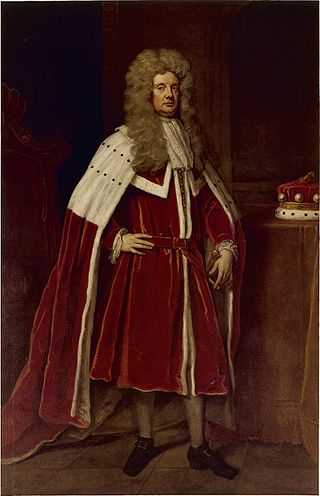Related Research Articles

Charles Calvert,3rd Baron Baltimore was an English peer and colonial administrator. He inherited the province of Maryland in 1675 upon the death of his father,Cecil Calvert,2nd Baron Baltimore. He had been his father's Deputy Governor since 1661 when he arrived in the colony at the age of 24. However,Charles left Maryland for England in 1684 and would never return. The events following the Glorious Revolution in England in 1688 would cost Calvert his title to Maryland;in 1689 the royal charter to the colony was withdrawn,leading to direct rule by the British Crown. Calvert's political problems were largely caused by his Roman Catholic faith which was at odds with the established Church of England.
Colonel Nicholas Greenberry was the 4th Royal Governor of Maryland,and Commander of the Military Forces of Anne Arundel and Baltimore Counties.
Edward Digges was an English barrister and colonist who became a premium tobacco planter and official in the Virginia colony. The son of the English politician Dudley Digges represented the colony before the Virginia Company of London and the royal government,as well as served for two decades on the colony's Council of State. Digges served as interim Colonial Governor of Virginia from March 1655 to December 1656,and for longer periods as the colony's receiver general and auditor-general. He is also known for planting mulberry trees and promoting the silk industry in the colony.
William Markham served as deputy governor of the Province of Pennsylvania. Markham was the acting governor of Pennsylvania from 1681 to 1682 and from 1693 to 1699. He was a member of the Church of England and tended to favor the interests of minority religious groups in the primarily Quaker colony.
John Coode is best known for leading a rebellion that overthrew Maryland's colonial government in 1689. He participated in four separate uprisings and briefly served as Maryland's governor (1689–1691) as the 1st Leader of the Protestant Associators.
Robert Beverley Jr. was a historian of early colonial Virginia,as well as a planter and politician.
Jesse Wharton was the 7th Proprietary Governor of Maryland during a brief period in 1676. He was appointed by the royally chartered proprietor of Maryland,Charles Calvert,3rd Baron Baltimore. Following his death,Wharton was briefly succeeded by Cecil Calvert,infant son of Charles Calvert,before the next Governor,Thomas Notley,was appointed.
Sir Lionel Copley was the 1st Royal Governor of Maryland from 1692 through his death in 1693. He was the first official royal governor appointed by the British crown after the colony was removed from the proprietary control of the Calvert family during the Glorious Revolution. Copley engaged in a series of political struggles with the colonial assembly and the colonial secretary,Thomas Lawrence,in the year between his arrival and his death the next year.
Sir Thomas Lawrence,3rd Baronet was the 2nd Royal Governor of Maryland in 1693,elected by the Governor's Council following the death of Sir Lionel Copley,(1648-1693). He governed the colony for only a few weeks before the new royally appointed governor,Edmund Andros,(1637-1714),arrived from his trans-Atlantic trip to take over control of the colony. He was briefly the 6th Royal Governor of Maryland a second time when Andros then left the colony in 1694. Lawrence's successor was Francis Nicholson.
Colonel Nathaniel Blakiston was the 8th Royal Governor of Maryland from 1698 to 1702. He succeeded Francis Nicholson and was succeeded by Thomas Tench. He was related to Nehemiah Blakiston.
Thomas Tench was the 9th Royal Governor of Maryland, from 1702 to 1704. He was appointed by his predecessor,Nathaniel Blakiston,and was succeeded by Colonel John Seymour.
A colonial agent was the official representative of a British colony based in London during the British Empire. The role evolved during the seventeenth and eighteenth centuries. Initially established as a temporary role to deal with a specific problem,by the eighteenth century the role became more permanent. However,this did not always mean there was full continuity
Peleg Sanford was an early governor of the Colony of Rhode Island and Providence Plantations,serving three consecutive terms from 1680 to 1683.
Blakiston is a surname. Notable people with the surname include:
Colonel William Digges was a prominent planter,soldier and politician in the Colony of Virginia and Province of Maryland. The eldest son of Edward Digges (1620-1674/5),who sat on the Virginia Governor's Council for two decades but died shortly before Bacon's Rebellion,Digges fled to Maryland where he married Lord Calvert's stepdaughter and served on the Maryland Proprietary Council until losing his office in 1689 during the Protestant Revolution,when a Puritan revolt upset the Calvert Proprietorship. His eldest son Edward sold his primary Virginia plantation to his uncle Dudley Digges. It is now within Naval Station Yorktown. His former Maryland estate,Warburton Manor,is now within Fort Washington Park. Two additional related men with the same name served in the Virginia General Assembly,both descended from this man's uncle and his grandson Cole Digges (burgess):William Digges (burgess) and his nephew and son-in-law William Digges Jr. both represented now-defunct Warwick County,Virginia.

The Protestant Revolution,also known Coode's Rebellion after one of its leaders,John Coode,took place in the summer of 1689 in the English Province of Maryland when Puritans,by then a substantial majority in the colony,revolted against the proprietary government led by the Catholic Charles Calvert,3rd Baron Baltimore.
William Bladen (1672–1718) was an English-born Attorney-General in Maryland,in what is now the United States,and briefly Secretary of that Province. He was the father of Thomas Bladen,Governor of Maryland and was the brother of Colonel Martin Bladen,Commissioner of the Board of Trade and Plantations. His nephew was Admiral Edward Hawke,1st Baron Hawke.
Governor Blakiston may refer to:
References
- ↑ Johnston, Christopher (1907). "Blakistone Family". Maryland Historical Magazine. Vol. 2, no. 1. p. 58. Retrieved March 15, 2023.

